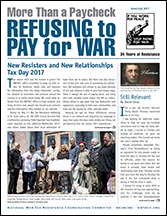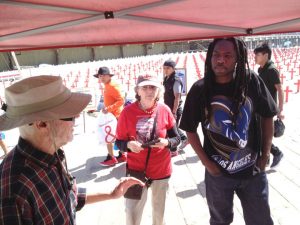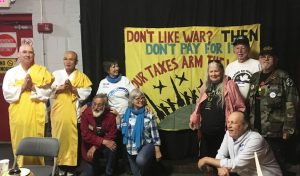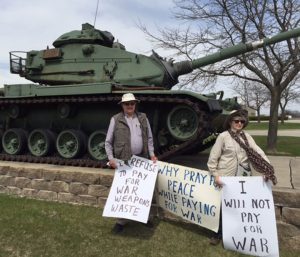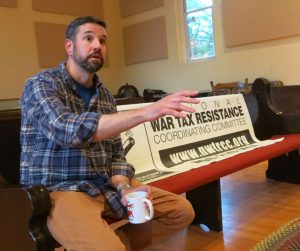More Than a Paycheck,
REFUSING to PAY for WAR
June/July 2017
Contents
- New Resisters and New Relationships – Tax Day 2017
- Still Relevant By David Gross
- Counseling Notes Private Debt Collectors May Contact You • Nondirective or “TMI” — and Other Topics
- Many Thanks to everyone who supports NWTRCC with their volunteer time or financial donations and to the following groups for recent donations
- Network List Updates
- War Tax Resistance Ideas and Actions Out In the Field with NWTRCC‘s Field Organizer • Upcoming Events • Dear Tax Resisters
- Resources Tweet! Tweet! Upcoming Webinars • Read Thoreau! • The Practical Series
- NWTRCC News Raising the Stakes in St. Louis by Ruth Benn
- PROFILE Fed Up and Taking the Next Tangible Step
Click here to download a PDF of the April/May issue
New Resisters and New Relationships – Tax Day 2017
Tax season 2017 was the busiest in years! The NWTRCC office scrambled to keep up with orders for literature, media calls, and requests for information from the newly interested. Luckily, our network of counselors and contacts around the country is in pretty good shape. We could make referrals from the NWTRCC office to that network, and many of those new people also found local contacts and the information they wanted on our website.
During our May 5-7 War Tax Resistance Gathering in St. Louis (see p. 6), the CMTC Escrow Account held a redirection ceremony, Field Organizer Sam Koplinka-Loehr reported on the Collective Redirection 2017, and others talked about their local redirection of taxes from war to peace. But there was also discussion of the pros and cons of promoting tax redirection. Not everyone who refuses to pay taxes because of war and violence is able to give that money away. There is always the risk of paying twice, and many who have seizable assets expect the IRS to collect. Others refuse to pay taxes that buy destruction and oppression, especially to their own communities, but must use the money for other pressing needs.
Keeping an eye on these differences among those in our network and adjusting our language in ways that open the door more widely are things we are learning from tax season 2017 experiences.
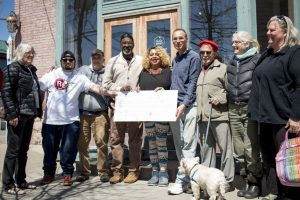
Redirecting war taxes to the Ultimate Reentry Opportunity in Ithaca, New York, (l to r) Cathy Currier, Edwin Santiago, unidentified,, Khalil Bey, Phoebe Brown, Todd Saddler, Neil Golder with Puccini, Mary Loehr, and Leslie Schultz.
Collective Redirection 2017
By Sam Koplinka-Loehr
This year, war tax resisters in Philadelphia, New York City, San Diego, Los Angeles, Ithaca, Asheville, Redway (California), and Phoenix jointly reported their tax redirection to resistance organizations led by Black, Brown, and Indigenous people in their local communities to our Collective Redirection. About $20,000 was given away as a stand against white supremacy in our government as well as in our organizing communities.
In March, I presented a workshop in Ithaca, New York, covering the basics of war tax resistance and the reasons for this collective redirection effort. Following my presentation, the war tax resistance community in Ithaca decided to redirect money to local Black and Indigenous groups. Mary Loehr reported back about how it went:
“Because of Sam’s encouragement, the Ithaca War Tax Resisters decided to give their money to two groups. One is called the Ultimate Reentry Opportunity. It helps people who are transitioning from jail or prison into the community. They are investing intentional time into fostering affinity, trust, dialogue and solidarity, which are key to dismantling the recidivism cycle. We are giving $1,350 to them.
“Secondly, we are giving to the SHARE farm. This is members of the Cayuga Nation who were burned out of their villages around 1780 by the U.S. government because they sided with the British. They were driven into Canada. They are now trying to return to their traditional lands. They have 60 acres on the east side of Cayuga Lake. They are consulting with their elders about accepting the money. If they accept it, we will give $1,350 to them also.
“Not speaking for the whole group, but it feels meaningful to me personally to be redirecting our tax dollars to these groups. Military spending and police state violence are causing people to be going to prison in the first place. And it was clearly a scorched earth military campaign that caused the Cayuga people to lose their land, so to be giving them redirected tax dollars feels like closing the circle in a small way and feels very right.”
Thanks to everyone who organized this effort in your local area. Do you think this effort should be continued in the years to come? Let us know! Contact me at organizer@nwtrcc.org.
Alternative Fund and Pooled Redirections
Some of these redirections are part of the Collective Redirection. Others gave a more general report to the NWTRCC office:
Conscience and Military Tax Campaign Escrow Account (CMTC-EA) held a Granting Ceremony during the NWTRCC Gathering in St. Louis. Recipients of $1,000 grants each were St. Louis Veterans for Peace Local Chapter 61; Quaker Palestine Israel Network working in Ramallah; WeCopWatch; and a special donation to Oxfam America in honor of the St. Louis-based human rights activist Hedy Epstein, who died at 91 in 2016.
Northern California People’s Life Fund gathered at the BFUU Fellowship Hall in Berkeley and gave out $32,000 in redirected taxes to 26 amazing peace and justice organizations. The evening program started with music by Kevbot with the Roots Rising, followed by a potluck dinner and the Granting Ceremony. Grantees included AfroCentric Oakland, 67 Sueños Program — Summer Mural Project, Longfellow Sanctuary School, Permaculture Action Network, Roots of Success (brochure for Employers to Hire Youth), and Bay Area GI Rights.
On Easter Sunday, April 16, the Southern California War Tax Resistance and Alternative Fund (SCWTR) redirected $6,000 in resisted war taxes to six local peace and justice organizations. The Redirection was held at the site of Arlington West, a project of Veterans for Peace, where crosses are placed to mark the deaths of U.S. military members in Iraq. Pictured (l to r), SCWTAF members Joe Maizlish and Frances Schneider-Liau talk with Phillip Lester, who represented the Youth Justice Coalition, which received a grant. Lester also placed a memorial cross for Christopher Murphy, a 30-year-old veteran of the Afghanistan War, who committed suicide just a few months ago in Concord, Massachusetts.
On April 15, the War Resisters League of Portland gathered together with friends and local groups for our annual Redirection Program. Leah Bolger of Veterans for Peace, and also on the speakers circuit for World Beyond War, started the program with an informative slideshow presentation on the myriad of ways the U.S. military poisons our planet. Our WRL group redirected $7,740 to five local groups: The Red Lodge for Native women transitioning out of prison; St. Luke’s Bridge fund for veterans needing short term help; Operation Nightwatch services to houseless population; Food Not Bombs; and, VOZ (support for day laborers). It was another successful tax day redirection. Together we DO make a difference!
—Kima Garrison
Eugene Taxes for Peace! was a key organizer with other local groups of the local Tax Justice March on April 15 with a call to Resist Taxe$ Supporting War On Our Planet! Then on tax day April 18, the group held their annual vigil and rally in downtown Eugene, announcing a $500 tax redirection to groups including Planned Parenthood, Occupy Medical, KLCC local NPR station, and Cascadia Forest Defenders.
NYC People’s Life Fund redirected $2,000 in monies donated by war tax resisters to local community groups in the New York City area doing work in our community that we would prefer our war taxes fund. This year the organizations were The New York Campaign for Alternatives to Isolated Confinement (CAIC); Desis Rising Up and Moving (DRUM) who work with South East Asian youth; Picture the Homeless; and the arts group Superhero Clubhouse.
New England War Tax Resistance reported an unprecedented number of strong applications for grants, including from groups never funded before. $4,700 was divided among nine groups: Association of Haitian Women, Beantown Society, Cosecha, Keep It 100, Maine WTR Resource Center, Student Immigrant Movement, Traprock Center for Peace and Justice, Young Abolitionists, and Youth Justice and Power Union.
Still Relevant
By David Gross
I am a war tax resister because Henry David Thoreau convinced me to be one.
I was looking for medicine: something to help me ease my troubled conscience and to help me sleep better at night. I turned to Thoreau and instead of medicine, he gave me marching orders. This turned out to be the cure I needed after all.
People sometimes remember Thoreau’s “Civil Disobedience” as being an argument for why people ought to have the right to disobey the law and its officials, when the reasons for doing so are good and noble. But the essay is actually more severe and challenging than that: Thoreau insists that you have the duty to disobey the law if the law commands what is wrong or forbids what is right.
I reread his essay in early 2003 as the invasion of Iraq was approaching, and his challenges took me by surprise. I too had misremembered Thoreau as making an abstract argument, and as pointing his finger at Them, not at me. I realized he was right. I stopped paying federal taxes.
I also began, like he had, to “quietly declare war with the State, after my fashion, though I will still make use and get what advantages of her I can, as is usual in such cases.” Thoreau’s statement at the time of the Fugitive Slave Act and the Mexican-American War — “How does it become a man to behave toward this American government to-day? I answer that he cannot without disgrace be associated with it” — is no less true now.
There are many types of war tax resistance, and many different sorts of arguments in its favor, but I remain comfortable calling myself a Thoreauvian, and have yet to find a better argument than the one that originally convinced me.
Please send NWTRCC your thoughts about “Thoreau today” or favorite quotes for use in this newsletter throughout the bicentennial year.
David Gross is the author/editor of a number of books including The Price Of Freedom: Political Philosophy From Thoreau’s Journals. His tax resistance blog “The Picket Line” is at sniggle.net/TPL.
Counseling Notes:
Private Debt Collectors May Contact You
Four companies — CBE Group, Conserve, Performant, and Pioneer — have begun collection work for the government. The program is starting slowly, but will build over the year. Private collectors are given cases in which the taxpayer has years-old unpaid taxes and the IRS has stopped trying to actively collect. Take note of the company names to distinguish them from the ubiquitous scam callers, and note these requirements:
- The IRS will give taxpayers written notice of accounts being transferred to a private collection agency. The agencies will send a separate letter to the taxpayer confirming this transfer. The initial contact will not be by telephone.
- Private collection agencies will identify themselves as contractors of the IRS and must follow the Fair Debt Collection Practices Act.
- Payment is made directly to IRS by check or at irs.gov, not to the private agencies.
- If you do not wish to work with the assigned private collection agency, you must submit
a request in writing to that collection agency.
Nondirective or “TMI” — and Other Topics
A variety of questions came up during a workshop for current resisters and a counselor training at NWTRCC’s recent gathering in St. Louis.
- A tenet of WTR counseling is to be nondirective, per our list of counseling tips: “We should be careful not to advise or try to convince counselees to follow one particular course of action, but rather assist them to make responsible decisions.” However, one counselor asked how to be nondirectional and yet not overwhelm a counselee with too many options. One response was to begin to narrow it down as the counselor understands the counselee’s personal situation as regards work and assets, along with goals and motivations for wanting to resist. Someone who lives off the grid has different choices than an individual with a career salaried job. This brought up the suggestion to create some kind of “choices in WTR” flow chart, an idea we’ll work on.
- What is the IRS response to low levels of resistance, like $10, $20, $50, even $100? We don’t know for sure. If you resist at a low level, has the IRS sent many collection letters? Have they collected from a salary or bank account? Or, does this level of resistance get ignored by and large? Contact NWTRCC with your experience.
- Explaining W-4 resistance can make anyone tongue-tied. Being clear about what’s legal or not is important. Encouraging workers to add at least one allowance so that the government is not getting a big loan is usually legal and often recommended by accountants to bring withholding into balance and avoid a big refund or a lot of taxes due. Some in our workshop said most people they know already take extra allowances to have more money in their pocket; others want the refund as a more guaranteed form of savings than “money in their pocket.” Additional allowances that leave tax due for resistance purposes risks penalties. For counselors, we recommend reading NWTRCC’s Practical #1 on W-4 resistance frequently, practice filling out the W-4 so you know the form, and then listen carefully to a counselee about their situation before launching into the ins and outs of W-4 resistance.
Many Thanks
We are grateful to each individual who has redirected some of their tax money to NWTRCC and to all of you who have (or will!) respond to our May fund appeal with a donation of any size. Please do read the great letter from a new resister, and the 2016 Annual Report, which shows how busy our network has been!
Special thanks for Affiliate dues payments and tax redirections from:
- Oregon Community of War Tax Resisters/Portland Chapter of War Resisters League
- Southern California War Tax Alternative Fund
- Taxes for Peace! Eugene, Oregon
- War Resisters League National Office
Network List Updates
The Network List of Affiliates, Area Contacts, Counselors, and Alternative Funds is updated and online at nwtrcc.org, or contact the NWTRCC office (nwtrcc@nwtrcc.org or (800) 269-7464) if you would like a printed list by mail.
Advertise to Activists! See the advertising rates for this newsletter or contact the editor at (800) 269‒7464.
War Tax Resistance Ideas and Actions
War tax resisters had a literature table and participated in the annual conference of the Global Network Against Weapons and Nuclear Power in Space. The event was held in Huntsville, Alabama. Pictured are war tax resisters and friends (l to r): Bother Utsumi, Sister Denise, Karl Meyer, Judy Collins, Clare Hanrahan, Jim Allen (back right), Barbara & Albert Strickland, Coleman Smith.
Don Timmerman and Roberta Thurstin found a special spot to pose during the Tax Day Vigil and Civil Disobedience at the U.S. Army Reserve Base in Milwaukee. The vigil was sponsored by Milwaukee War Tax Resistance and Casa Maria Catholic Worker with Peace Action-Wisconsin and Welfare Warriors.
Out In the Field with NWTRCC’s Field Organizer
By Sam Koplinka-Loehr
Following the national gathering in St. Louis, I did a small presentation tour focused on war tax resistance and racial justice. I first went to Chicago for a luncheon conversation at Christian Peacemaker Teams. We brought together a group of CPT staff and longtime war tax resisters from the area. It was a good conversation and hopefully will spur some additional organizing in the Chicago area in the months to come.
After that, I presented at a few community meetings in South Bend, Indiana. One was a Showing Up for Racial Justice meeting. It seems like SURJ is a solid space for talking about war tax resistance as an avenue for reaching white folks who are looking for tactics and strategies to challenge our government’s white supremacist violence.
The following day I co-led a community presentation with Darryl Heller, the director of the South Bend Civil Rights Heritage Center. The crowd was older and not as “primed” for radical tactics, but we made some good connections, and it was a chance for people to think through what is required to build community and resist in an era of increased violence and repression. It was great to meet Darryl, who was a war tax resister for many years in the 1980s.
A big thanks to Sarah Thompson and Mark Frey at Christian Peacemaker Teams, as well as Carter Kelly and Peter Smith for hosting me.
I am planning out my next 6 months of travel now, so if you are interested in hosting a workshop in your community, please contact me: organizer@nwtrcc.org, 607-592-7650.
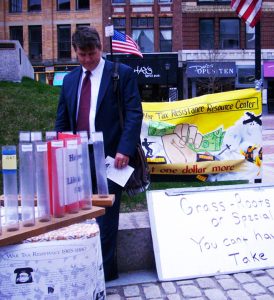
A penny poll and leafleting were held on Tax Day in downtown Portland, Maine, sponsored by the Maine WTR Resource Center. More than a dozen communities in Maine along with some college campuses hosted tables and leafleting from late March through Tax Day. The effort was coordinated by the Resource Center. Photo by Ginny Schneider.
Upcoming Events
Satyagraha Institute, August 4-13, Placerville Camp & Retreat Center, in the Black Hills of South Dakota. provides leaders interested in nonviolent social change an opportunity to deepen their understanding, skills, commitment, and community. satyagrahainstitute.org
Veterans for Peace Annual Convention 2017, August 9-13, Hilton Palmer House, Chicago. NWTRCC will have a literature table and has applied for a workshop. Please come find us there! veteransforpeace.org
Campaign Nonviolence Week of Action, September 16-24, take action around the International Day of Peace, September 21, to support a global nonviolent shift! paceebene.org/programs/campaign-nonviolence
NWTRCC Fall Gathering in conjunction with the New England Gathering of War Tax Resisters and Supporters, November 3-5, Amherst, Massachusetts. Save the date!
Border Convergence, School of the Americas Watch, November 10-12, in Ambos Nogales at the militarized U.S./Mexico border. NWTRCC expects to have an active presence there. Please let us know if you plan to attend. soaw.org
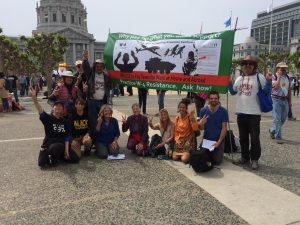
Northern California War Tax Resistance with their banner promoting W-4 resistance. They marched in the April 15 Tax March-San Francisco. Photo courtesy of Susan Quinlan.
Dear Tax Resisters
You don’t know me, but according to several conservative and fake news websites, I’m leading the tax resistance against Trump.
According to World Politicus (a propaganda site run out of Macedonia) “Andrew Newman, an associate professor of English and history at Stony Brook University on Long Island…leads one of the biggest tax protests.”
The report gets my job title right, but my leadership and, unfortunately, the large-scale tax resistance are fake news. Here’s how I came to the attention of entrepreneurial teenagers in the Balkans: I submitted an Op Ed to the U.S. edition of The Guardian that drew on Thoreau’s “Civil Disobedience” (which I teach sometimes in my American literature classes) to make a case for tax resistance against Trump. They didn’t publish my essay, but Joanne Walters, a reporter for The Guardian, called to interview me for an article on tax resistance. I explained to her that I’d already paid 2016 taxes, through federal withholdings, and that I planned to resist paying a portion of my 2017 taxes. The article, published on February 15 under the headline: “We will not pay: the Americans withholding their taxes to fight Trump,” included those details. But the lead made my action seem more dramatic: “Andrew Newman always pays his taxes, even if he hates what the government is doing with them. But not this year.”
After the appearance of The Guardian article, my email in-box and twitter feed started filling up with wingnut denunciations. Although I was also heartened by commendations from colleagues, students and strangers, I found it unnerving to suddenly see my name in the same sentence with “federal prison.” I knew there was little precedent for criminal prosecution for the sort of tax resistance I was talking about, but I was worried that I had been foolhardy in declaring my intention to commit a crime as an act of resistance against a would-be authoritarian. I was also unhappy about how the article, however well-intentioned, misrepresented my actions, and even my words. And where were the other tax resisters against Trump? Apparently, Ms. Walters had found only one other person willing to go on record: Ruth Benn of the NWTRCC, whose longstanding war tax resistance wasn’t specifically a response to the 2016 election.
One positive outcome of this experience is that it brought me in touch with Ruth and the NWTRCC, and I’ve learned a little more about what I’m talking about. After the initial appearance of The Guardian article, I declined interview requests from CNN and some talk radio stations, but I’ve since agreed to others, including from student-journalists at Stony Brook. So I’ve continued to make the case for tax resistance (and to clarify that I haven’t actually done any, yet). I fully recognize that this case doesn’t begin or end with Trump. But I also believe that today’s “Resistance” should adopt the tactics of the war tax resistance movement. I know there are millions of people who believe that Trump is illegitimate (in my view, this illegitimacy extends to the Republican majorities in Congress and the Supreme Court) and deplore this administration’s uses of our tax dollars. I’m surprised and a little disheartened that I haven’t yet seen other calls for tax resistance, even in the progressive media. Hopefully, next year, when journalists report on tax resistance against Trump, there will be a lot of other people to call.
Andrew Newman lives in Brooklyn and is actively brainstorming new ideas for war tax resistance organizing.
Resources
Tweet! Tweet! Upcoming Webinars
Want to get more active on Twitter and/or Facebook in these times, but not sure how? Join NWTRCC consultants Erica Weiland and Sam Koplinka-Loehr for our two “How to Use Social Media to Promote War Tax Resistance” webinars. Each webinar is one hour long and will be recorded so members of our network can watch them later!
Social Media 101: Getting started with Twitter and Facebook
Tuesday, June 13, 9 PM EST – 6 PM Pacific
Social Media 201: Using social media to create change
Wednesday, June 21, 9 PM EST – 6 PM Pacific
Register at http://tinyurl.com/WTRsocialmedia today!
We want these webinars to be relevant to you! Send questions or topic suggestions to Erica at wartaxresister@nwtrcc.org. We’ll be sure to cover them during the appropriate webinar or get back to you personally about them. Please register so that you will receive automatic reminders about the webinar and when it is available for later viewing.
Read Thoreau!
The Price of Freedom: Political Philosophy from the Journals of Henry David Thoreau, Edited by David M. Gross (Picket Line Press, 2008, 250 pp.)
“My thoughts are murder to the state…. I trust that all just men will conspire.” That quote and others on law, government, man in society, war, economics, duty, and conscience are collected in their larger context in this volume edited by tax resister/blogger David Gross. The passages are pulled from Thoreau’s journals written “free of censorship” between 1837 and 1861. Celebrate Thoreau’s bicentennial year and order the book today from NWTRCC! $14.50 postpaid.
The Practical Series
These valuable booklets are worth a read every few months — for new and current resisters. You can read or download them from our website or order from the NWTRCC office: single copies #1-3 75¢ each, #4-7 $1 each, plus .70 postage per booklet. Contact the NWTRCC for bulk rates if you would like extras for meetings or tabling.
#1: Controlling Federal Tax Withholding
#2: To File or Not To File an Income Tax Return
#3: How to Resist Collection, or Make the Most of Collection When it Occurs
#4: Self Employment: An Effective Path for War Tax Resistance
#5: Low Income/Simple Living as War Tax Resistance
#6: Organizational War Tax Resistance
#7: Health Care and Income Security for War Tax Resisters
#8: Relationships and War Tax Resistance
Ask for a literature list from the office, 800-269-7464 or email nwtrcc@nwtrcc.org. To order war tax resistance literature see nwtrcc.org/store, or send a check to NWTRCC PO Box 150553, Brooklyn, NY 11215.
NWTRCC News
Raising the Stakes in St. Louis
By Ruth Benn
“Raising the Stakes: War Tax Resistance and Community Survival in Troubled Times” was the theme for the May 5-7 National War Tax Resistance Gathering in St. Louis. The weekend was hosted by the new Dick Gregory Catholic Worker House, and co-sponsored by Veterans for Peace and the St. Louis Chapter of Women’s International League for Peace and Freedom.
VFP International Advisory Board Member Matthew Hoh laid the groundwork for what it can mean to “raise the stakes” of resistance through his very personal story of moving from a career in military and government to publicly resigning over U.S. policies in Afghanistan. He found his way to Veterans for Peace, became a war tax resister in 2015, and continues on this quest to raise the stakes for change. His story also challenged us to consider our WTR outreach to potential new resisters. What is it that clicks with some activists and not others?
On Saturday, Tax Day action reports were followed by considering what we can build on for tax season 2018. Comments included being energized by the Collective Redirection and plans to carry that into next year; speaking out at Open Mics to audiences we might consider unreceptive; finding co-hosts for workshops from activist communities we have not worked with before; telling stories that connect with the lives of people you are trying to reach; challenging the system includes not participating in it and creating alternative lifestyles. While part of the group took banners and headed to the Joy Parade, part of Cinco de Mayo celebrations in St. Louis, others stayed to continue discussions about action ideas and how to better interact as antiwar activists with other groups. One idea that gained strong support was to use the alternative fund model in our presentations to talk about how resisted money can be used in our communities. Letting that community decide where the funds are going to go could be very empowering. We vowed to update our materials about alternative funds in a style that might renew interest today.
The Coordinating Committee meeting on Sunday morning dealt with proposals and business-related decisions for NWTRCC. The Administrative Committee coordinated reviews of all three consultants, Ruth Benn, Erica Weiland, and Sam Koplinka-Loehr. Network members were invited to fill out a survey for each, resulting in good suggestions and positive reviews all around. Finances are in decent shape, and we agreed to accept a proposal to give $750 to the Maine WTR Resource Center to continue their fine work. With new budgeting in the fall we’ll create a support fund for affiliates and potential affiliate groups. The Field Organizer position was originally funded for one year, through mid-September. We agreed to extend it to the end of 2017 and also to raise the rate by a few dollars now and equal to other consultants in the new year. Establishing an annual raise for consultants based on federal Cost of Living increases led to a lengthy discussion. The group agreed to the COLA with the caveat that budget constraints each year will determine whether it is added in or not.
Members of the Administrative Committee shift each May, and this year one member, Rachel Soltis, is rotating off the committee, while Cathy Deppe agreed to two more years. Chrissy Kirchhoefer becomes a full member. New Alternates are Sarah Lawrence College student Justin Becker and San Diego activist Anne Barron.
The next gathering will be in Amherst, Massachusetts, in conjunction with the annual New England Gathering of War Tax Resisters and Supporters. Save the dates — November 3-5, 2017.
A huge thanks to Chrissy Kirchhoefer for a terrific job (and a lot of hard work) hosting the weekend.

Chrissy Kirkhoefer, our St. Louis host, is active with WeCopWatch. She arranged for David Whitt to come to the gathering and give us an overview of the work of WeCopWatch, aspects nof trainings, and the importance of independent eyes on police activity. The St. Louis group grew out of the shooting of Michael Brown in Ferguson. Look them up on the internet and consider a training in your community. Our training was given high marks during the evaluation. Photo by Ruth Benn.
PROFILE
Fed Up and Taking the Next Tangible Step
Sam Koplinka-Loehr interviews Sarah Mueller
Sarah Mueller is a first year war tax resister. She lives in Philadelphia and is actively involved in justice-centric community film programming, neighborhood gardening initiatives, as well as, organizing for racial justice.
Sam: As someone who is new to war tax resistance, what is exciting to you about this form of resistance?
Sarah: I first learned of war tax resistance many years ago through my church, Circle of Hope, a Brethren in Christ Church of the Mennonite/Quaker world. I was very intrigued because of the practical nature of its resistance: “We are opposed to war and militarization, therefore we will not pay for it!” That planted the seed years ago. In recent years, in the wake of Black Lives Matter and other organizing around police brutality, more and more people were talking about the correlation between Washington’s war machine and the over-policing and the killing of black and brown people in our city streets. At some point, I realized that I cannot pay for this anymore. I had already done a lot of marching in the streets and wanted to continue to do that as I was able, but this felt like the next tangible step for me. I feel so fed up. My money will not go to the killing and the over-policing of black and brown communities — the communities that I live amongst, folks who are my family and friends.
Growing up, what led you to be involved in these struggles?
I come from Lancaster County. Growing up in an upper middle class family, in a very “safe protected little bubble,” everything was very homogeneous and white. That was my life. It was very “safe.” In high school, I felt very drawn to the city of Philadelphia because of the amount of different people. In my naive mind, I thought city life was everyone coexisting without tension, just like Sesame Street. So, in the summer of 2002, I moved here for college. After I graduated, I got involved in community education working in North Philly. I came into contact with formerly incarcerated youth and began to hear more and more about their time behind bars and their struggles to find jobs after, as well as the gross cycles of poverty. I began to struggle with my own privilege. At some point, I needed to move beyond the guilt. I began to move towards the idea of using my privilege, whether it’s my education or whether it is my access to resources like money and time.
I’ve learned so much, and it has forever changed my life, friends, and relationships. The urge to do more persisted. Becoming awake has a snowballing or domino effect. The more that you become aware of the ways of the world, the more you see how it is all interconnected.
I’ve always known that one person cannot change the world. But there is so much power in community when we grow and bind together. I look at my gardening work that way, as a reconciliatory peacemaking activity. It re-engages people with how to grow their own food, with skillsets and wisdoms that were robbed from them. I am very thankful and honored to do this work.
Something that my church and father taught me is that a life in active faith is a life being awake to the world, that it’s all cut of one whole cloth. The world, and American culture particularly, wants us to silo all aspects of our lives. Whether it’s our sexuality and gender, our finances, who we associate with, our paid work, or our organizing and activism—I am learning that this is one whole life.
For me, becoming a war tax resister, is all part of that. I’m trying to figure out how all of my ideas, about how the world is supposed to work, can all play in together. My money, your money, is inherently tied up in the system. We can’t ever fully avoid that, but we can make a serious point and that is that we don’t have to pay for this. We don’t have to pay for perpetual war, for over-policing and murder here and abroad, and no one can force us to.
How is tax resistance a part of your community?
For me, one word that I have become very comfortable using, which scares a lot of white people, is the word reparations. Talking about reparations is one sure way to clear a room — to get a whole lot of white people to 100% shutdown. They’re like “you were just talking about Black Lives Matter. You got me there. But now you’re talking about reparations? That’s too far.”
I have built the idea of reparations into my personal budget. It is wildly life-giving. As a white person, to return or re-direct money and resources to Black and Brown communities is very freeing. Over the years, I’ve learned to hold my money loosely, because it’s not really my money.
When you hold money and you begin to assess the privilege you have and were given in terms of access, you realize that the money was never really yours in the first place. It is all connected to white supremacy, white heritage, and the perpetuation of white control of land. You realize you have way more to give than you first realized. We can give out of however much or little we possess. There’s lots out there. It’s exciting to see how much we can do.
This past month, there was an incredible campaign, called Mama’s Bailout Day, initiated by several racial justice and criminal justice reform organizations. The local Philly campaign raised over $58,000! There is so much power in that Philadelphia came together to bail out all these women and femmes enabling them to spend Mother’s Day with their kids and families. That’s a big deal! You begin to realize that all the lies that the government and white America has perpetuated are based on a scarcity mentality, always saying “there is not enough to go around.” But I have realized in my own journey, and am learning more so every day, that there is so much.
